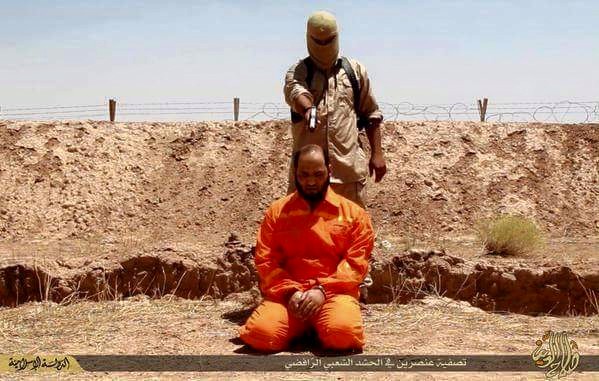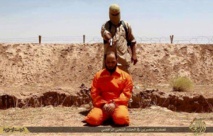"Daesh kidnapped at least 230 people, including at least 60 Christians, during a sweep through Al-Qaryatain," the Syrian Observatory for Human Rights said, using an Arabic acronym for IS.
Amnesty International condemned the abductions as highlighting "the dreadful plight of civilians caught up" in the more than four-year-old Syrian conflict that has cost over 240,000 lives.
Al-Qaryatain lies at the crossroads between IS territory in the eastern countryside of Homs and areas further west in the Qalamun area bordering Lebanon.
It had a pre-war population of 18,000, including Sunni Muslims and around 2,000 Syriac Catholics and Orthodox Christians.
Few Christians remained following the IS offensive in the region but the town was always seen as a symbol of harmonious religious coexistence.
During the 7th century Arab invasions, the town's Christian population decided that half of every family would convert to Islam to protect the other half, a Qaryatain-born woman told AFP.
"This is why residents often have the same name even though they belong to different faiths," she said.
She recalled an oecumenical mass celebrating the renovation of a 6th century church in 2009 that was attended by the local imam.
Father Jacques Mourad and Father Paolo Dall'Oglio, two champions of Muslim-Christian friendship who have been kidnapped by IS, also took part in that mass, she said.
In neighbouring Iraq, it was almost exactly a year ago that an IS offensive east of Mosul forced tens of thousands of Christians to flee their homes.
- Mosul executions -
The exodus, the first anniversary of which clerics marked Thursday with a symbolic prayer near the frontline with IS, is considered the worst disaster to befall one of the oldest Christian communities in the world.
The northern Iraqi region was home to many of the country's other minorities, such as the Yazidis, Shabak and Kakai.
Some of the Sunnis who stayed on in Mosul, Iraq's second city, have also paid a heavy price, with the promised government operation to liberate the city still on the drawing board.
Officials said IS had executed more than 2,000 people who challenged its extremist interpretation of Islam since it conquered the city on June 10 last year.
Security and medical sources in and around Mosul told AFP a list of 2,070 names had been handed to the Mosul branch of the health ministry demanding death certificates be issued.
Parliament speaker Salim al-Juburi confirmed "the execution of more than 2,000 innocent citizens at the hands of the terrorist Daesh organisation."
"We are appalled to hear that the health ministry has been provided those lists of 2,070 people killed in cold blood by Daesh," said the Civil Gathering for Reform, a local rights organisation said.
Among those listed on the IS order were policemen, former army officers, local officials, lawyers, journalists, doctors, rights activists. The names show that many women were also slain.
IS has made no secret of its campaign of executions against those refusing to submit to its rule or even simply suspected of secretly working against them.
- Fears for Croatian hostage -
It has carried out several public executions, including by decapitation, firing squad, stoning or in at least one known case by pushing the accused off a high building.
Backed by the US-led 60-nation coalition, Baghdad and the autonomous Kurdistan region have clawed back some of the land lost to IS last year.
Despite the thousands of air strikes against it, the jihadist ideology of IS has spread, with franchises mushrooming across the Middle East and beyond.
The group's branch in Egypt kidnapped a Croatian man near Cairo and released a video this week threatening to execute him unless the Egyptian government released jailed Muslim women by Friday.
Regional and global efforts have so far failed to break the back of the organisation led by Abu Bakr al-Baghdadi.
The United States and Turkey, long accused of abetting jihadist expansion, recently agreed on an "IS-free zone" in northern Syria.
The plan's implementation remains unclear but Washington has billed it as a potential breakthrough.
Speaking to columnists in the White House on Wednesday, US President Barack Obama said hope was growing of a political settlement in Syria.
Russia and Iran, the main backers of Syria's embattled President Bashar al-Assad, were beginning to "realise that the trend lines are not good for" the regime, he said.
Iran's Deputy Foreign Minister Hossein Amir-Abdollahian, whose country finds itself on the same side in opposing IS, on Wednesday also spoke of a possible political solution.
"Now many of the players consider resorting to and focusing on a political solution as the most appropriate way to solve the Syrian crisis," he said.
-----------------------------------------------------------------------------------------------------------------------------------
Amnesty International condemned the abductions as highlighting "the dreadful plight of civilians caught up" in the more than four-year-old Syrian conflict that has cost over 240,000 lives.
Al-Qaryatain lies at the crossroads between IS territory in the eastern countryside of Homs and areas further west in the Qalamun area bordering Lebanon.
It had a pre-war population of 18,000, including Sunni Muslims and around 2,000 Syriac Catholics and Orthodox Christians.
Few Christians remained following the IS offensive in the region but the town was always seen as a symbol of harmonious religious coexistence.
During the 7th century Arab invasions, the town's Christian population decided that half of every family would convert to Islam to protect the other half, a Qaryatain-born woman told AFP.
"This is why residents often have the same name even though they belong to different faiths," she said.
She recalled an oecumenical mass celebrating the renovation of a 6th century church in 2009 that was attended by the local imam.
Father Jacques Mourad and Father Paolo Dall'Oglio, two champions of Muslim-Christian friendship who have been kidnapped by IS, also took part in that mass, she said.
In neighbouring Iraq, it was almost exactly a year ago that an IS offensive east of Mosul forced tens of thousands of Christians to flee their homes.
- Mosul executions -
The exodus, the first anniversary of which clerics marked Thursday with a symbolic prayer near the frontline with IS, is considered the worst disaster to befall one of the oldest Christian communities in the world.
The northern Iraqi region was home to many of the country's other minorities, such as the Yazidis, Shabak and Kakai.
Some of the Sunnis who stayed on in Mosul, Iraq's second city, have also paid a heavy price, with the promised government operation to liberate the city still on the drawing board.
Officials said IS had executed more than 2,000 people who challenged its extremist interpretation of Islam since it conquered the city on June 10 last year.
Security and medical sources in and around Mosul told AFP a list of 2,070 names had been handed to the Mosul branch of the health ministry demanding death certificates be issued.
Parliament speaker Salim al-Juburi confirmed "the execution of more than 2,000 innocent citizens at the hands of the terrorist Daesh organisation."
"We are appalled to hear that the health ministry has been provided those lists of 2,070 people killed in cold blood by Daesh," said the Civil Gathering for Reform, a local rights organisation said.
Among those listed on the IS order were policemen, former army officers, local officials, lawyers, journalists, doctors, rights activists. The names show that many women were also slain.
IS has made no secret of its campaign of executions against those refusing to submit to its rule or even simply suspected of secretly working against them.
- Fears for Croatian hostage -
It has carried out several public executions, including by decapitation, firing squad, stoning or in at least one known case by pushing the accused off a high building.
Backed by the US-led 60-nation coalition, Baghdad and the autonomous Kurdistan region have clawed back some of the land lost to IS last year.
Despite the thousands of air strikes against it, the jihadist ideology of IS has spread, with franchises mushrooming across the Middle East and beyond.
The group's branch in Egypt kidnapped a Croatian man near Cairo and released a video this week threatening to execute him unless the Egyptian government released jailed Muslim women by Friday.
Regional and global efforts have so far failed to break the back of the organisation led by Abu Bakr al-Baghdadi.
The United States and Turkey, long accused of abetting jihadist expansion, recently agreed on an "IS-free zone" in northern Syria.
The plan's implementation remains unclear but Washington has billed it as a potential breakthrough.
Speaking to columnists in the White House on Wednesday, US President Barack Obama said hope was growing of a political settlement in Syria.
Russia and Iran, the main backers of Syria's embattled President Bashar al-Assad, were beginning to "realise that the trend lines are not good for" the regime, he said.
Iran's Deputy Foreign Minister Hossein Amir-Abdollahian, whose country finds itself on the same side in opposing IS, on Wednesday also spoke of a possible political solution.
"Now many of the players consider resorting to and focusing on a political solution as the most appropriate way to solve the Syrian crisis," he said.
-----------------------------------------------------------------------------------------------------------------------------------









 Home
Home Politics
Politics











